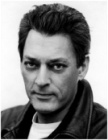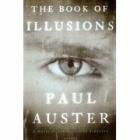
 MOON PALACE by Paul Auster (hier online bestellen)
MOON PALACE by Paul Auster (hier online bestellen)
The story:
Moon Palace is a novel written by Paul Auster that was first published in 1989.
The plot is set in Manhattan and the U.S. Midwest, and is centered around the life of the narrator
Marco Stanley Fogg and the two previous generations of his family.
Fogg is an orphan, and his Uncle Victor is his only caretaker. The story begins when Fogg goes to college
and lives in a college dormitory. One year later he moves into his own apartment furnished with 1492 books
given to him by Uncle Victor. Uncle Victor dies before Fogg finishes college and leaves him without
friends, family or money. Fogg becomes an introvert and spends his time reading. He thinks, "Why should I
get a job? I have enough to do living through the days." After selling the books in order to earn money
Fogg loses his apartment and lives in Central Park. He also meets Kitty Wu and begins a furious romance
after he had been rescued from Central Park by his friend Zimmer and Kitty Wu. However, he does find a
job taking care of Thomas Effing, who, he learns much later, is his grandfather.
Fogg learns about the complicated history of his parents, and Effings' previous identity as the painter
Julian Barber. When Effing dies, leaving money to Fogg, Fogg and Kitty Wu set up a house together in
Chinatown. After an abortion Fogg breaks up with Kitty Wu and travels across the U.S. to search for
himself. He begins his journey with his father Solomon Barber, who dies shortly after an accident on
Westlawn Cementery, where Fogg's mother is buried. Fogg continues their journey alone, which ends on
a lonely California beach. Fogg muses, "This is where I start, I said to myself, this is where my life
begins."
The moon
In an interview, published in The Red Notebook, Paul Auster looks at the meanings of the moon in
Moon Palace:
The moon is many things all at once, a touchstone. It’s the moon as myth, as ‘radiant Diana, image of
all that is dark within us’; the imagination, love, madness. At the same time, it’s the moon as object,
as celestial body, as lifeless stone hovering in the sky. But it’s also the longing for what is not, the
unattainable, the human desire for transcendence. And yet it’s history as well, particularly American
history. First, there’s Columbus, then there was the discovery of the west, then finally there is outer
space: the moon as the last frontier. But Columbus had no idea that he’d discovered America. He
thought he had sailed to India, to China. In some sense Moon Palace is the embodiment of that
misconception, an attempt to think of America as China. But the moon is also repetition, the cyclical
nature of human experience. There are three stories in the book, and each one is finally the same.
Each generation repeats the mistakes of the previous generation. So it’s also a critique of the notion
of progress.
Also look at: the internet-project on Moon Palace done by a 'Leistungskurs' of the Lessing Gymnasium in Berlin.
Students from the Lessing school, thank you all for the good work and keep on going like this!
About the author:
 Some aspects of the main character's life in Moon Palace mirror the life of the author. He was a descendant
of an Austrian Jewish family, born on the Third of February 1947 in Newark, New Jersey, which is only 20
miles southwest of New York. He also attended high school there. In his childhood, Auster's father Samuel
Auster was often absent. Samuel Auster was a businessman who left the house in the morning before his son
was awake and returned home when he was already in bed. Auster always searched for someone to replace his
father. Unlike his father his mother gave Auster very much attention.
Some aspects of the main character's life in Moon Palace mirror the life of the author. He was a descendant
of an Austrian Jewish family, born on the Third of February 1947 in Newark, New Jersey, which is only 20
miles southwest of New York. He also attended high school there. In his childhood, Auster's father Samuel
Auster was often absent. Samuel Auster was a businessman who left the house in the morning before his son
was awake and returned home when he was already in bed. Auster always searched for someone to replace his
father. Unlike his father his mother gave Auster very much attention.
Paul Auster and Marco Fogg were both born in 1947.
Marco's, Solomon's and Paul's father were all absent during their sons' childhoods.
When Paul's uncle travelled to Europe he stored several boxes of books at the Austers' home. Paul Auster
read one book after the other. The same goes for Marco, who read his Uncle Victor's books.
They both studied at Columbia University, New York.
Both of them were involved in the student's demonstrations at Columbia University.
Both Paul and Marco lost a lot of weight after running out of money.
Effing and Paul went to France (Paris).
Buchdaten:
MOON PALACE
Sprache: Englisch
Broschiert: 320 Seiten
Verlag: Faber & Faber, London; Auflage: New ed. (Februar 2004)
ISBN: 0571142206
Preis: € 8,95
More works from the same author:
zurück zur Übersicht
|
 MOON PALACE by Paul Auster (hier online bestellen)
MOON PALACE by Paul Auster (hier online bestellen)
 Some aspects of the main character's life in Moon Palace mirror the life of the author. He was a descendant
of an Austrian Jewish family, born on the Third of February 1947 in Newark, New Jersey, which is only 20
miles southwest of New York. He also attended high school there. In his childhood, Auster's father Samuel
Auster was often absent. Samuel Auster was a businessman who left the house in the morning before his son
was awake and returned home when he was already in bed. Auster always searched for someone to replace his
father. Unlike his father his mother gave Auster very much attention.
Some aspects of the main character's life in Moon Palace mirror the life of the author. He was a descendant
of an Austrian Jewish family, born on the Third of February 1947 in Newark, New Jersey, which is only 20
miles southwest of New York. He also attended high school there. In his childhood, Auster's father Samuel
Auster was often absent. Samuel Auster was a businessman who left the house in the morning before his son
was awake and returned home when he was already in bed. Auster always searched for someone to replace his
father. Unlike his father his mother gave Auster very much attention.



